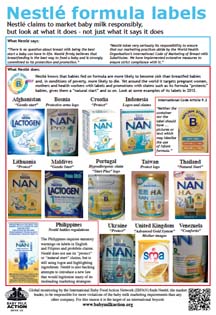Nestle's Creative Storytelling Venture
Look at what Nestlé does not just what it says
You always need to look beyond what Nestlé says if you want to see the truth about its business operations – and understand the tactics it uses to divert criticism.
For example, in 2013 Nestlé issued a press release, Nestlé among top performers in new Access to Nutrition Index (ATNI). This is an initiative developed by the Global Alliance for Improved Nutrition (GAIN - pg 14).
Nestlé scores well for promoting processed foods to the poor through its much criticised 'Popularly Positioned Products' and making statements that may sound good.
However, Nestlé droped the second part of the ATNI assessment, highlighted below:
Nestlé is among the top three performers in the ATNI Global Index and it performs well in almost all areas assessed by ATNI with the exception of its marketing practices related to breast-milk substitutes.
Breastmilk substitutes is the one area where ATNI considers monitoring of what companies are actually doing – not just their statements and management policies, looking to evidence in IBFAN’s reports.
What Nestlé says:
There is no question about breast milk being the best start a baby can have in life. Nestlé firmly believes that breastfeeding is the best way to feed a baby and is strongly committed to its protection and promotion.
Nestlé takes very seriously its responsibility to ensure that our marketing practices abide by the World Health Organisation’s International Code of Marketing of Breast-milk Substitutes. We have implemented extensive measures to ensure strict compliance with it.
What Nestlé does:
 Nestlé knows that babies fed on formula are more likely to become sick than breastfed babies and, in conditions of poverty, more likely to die.
Nestlé knows that babies fed on formula are more likely to become sick than breastfed babies and, in conditions of poverty, more likely to die.
Yet around the world it targets pregnant women, mothers and health workers with labels and promotions with claims such as its formula 'protects' babies, gives them a 'natural start' and so on.
● Download Baby Milk Action's poster with a selection of Nestlé labels from around the world.






